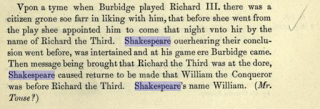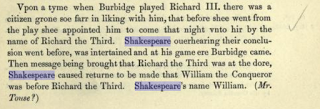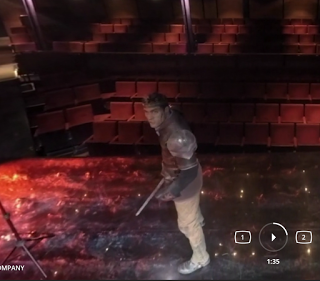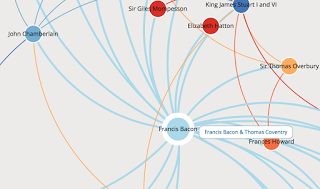Many of the geeks out there have heard the old story about Richard Burbage (playing Richard III at the time) arranging a late night encounter with a female fan, only to have Shakespeare get there first and deliver the famous line, “William the Conqueror came before Richard III!”
Year: 2015
Virtual Reality Shakespeare is Coming
I first heard the term “virtual reality” 30 years ago and oh mama look how far it’s come. I’ve got not one but two sweet looks into the future of Shakespeare performance for you, my geeks.
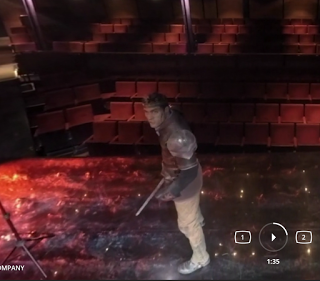 First is the Google Cultural Institute, who in partnership with the Royal Shakespeare Company brings you a 360degree Henry V experience. You’re placed right there on stage and you get to look around in all dimensions, just by dragging around the screen. Don’t miss the numbered buttons at the bottom that will switch your camera view!
First is the Google Cultural Institute, who in partnership with the Royal Shakespeare Company brings you a 360degree Henry V experience. You’re placed right there on stage and you get to look around in all dimensions, just by dragging around the screen. Don’t miss the numbered buttons at the bottom that will switch your camera view! 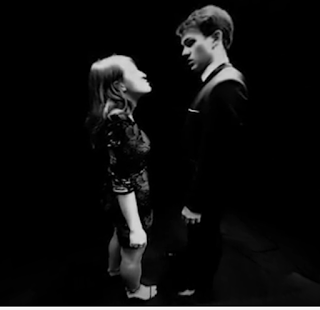 Then I met Vrideo. Much like the Google experiment above they are offering 360degree videos. Only these are immersive.
Then I met Vrideo. Much like the Google experiment above they are offering 360degree videos. Only these are immersive.Sorry Gandalf, I’m Gonna Side With Hannibal On This One
Sir Ian McKellen doesn’t think you should read Shakespeare.
Sir Anthony Hopkins does.
How great is it that we can actually have a conversation that starts this way? Both actors are starring in The Dresser, and there’s plenty of articles coming out where both are interviewed.
McKellen: “I don’t think people should bother to read Shakespeare. They should see him in the theatre! Reading just reduces him to an examination subject.”
In the joint interview, Sir Anthony urged actors to read “anything you can get your hands on” and took a less rose-tinted view of acting in the theatre.
Failure Is Not An Option (A Geeklet Story)
My oldest has been distraught lately over her first C on a significant exam, and we’ve been discussing daily whether getting all A’s is the most important thing in the world. She seems to think I enjoy watching her get bad grades because it shows that she’s finally working hard enough, but she feels that if those bad grades cause her to not get into college then what’s the point.
“If I FAIL….” she starts.
“We fail?” I interjected, predictably. “Screw your courage to the sticking place and we’ll…not….fail!”
Blank stare. Open mouthed, speechless daughter.
“Lady Macbeth,” I explain.
“That’s not what I thought you were going to say,” she countered.
“Also Beauty and the Beast,” I said. “Gaston.”
“That’s what I thought you were going to say.”
Six Degrees of Francis Bacon
Ok, this might be the geekiest thing you read all day.
You’ve probably heard of the game “Six Degrees of Kevin Bacon”, where you name an actor and then have to link him back to Kevin Bacon in less than six movies. It’s based on the “six degrees of separation” theory.
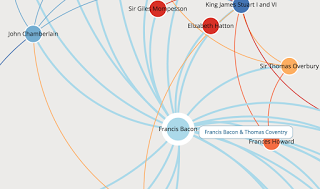 Well, I’m honestly surprised that it’s taken this long for someone to think of Six Degrees of Francis Bacon. What exactly was the original Bacon’s social network, and were people like William Shakespeare on it?
Well, I’m honestly surprised that it’s taken this long for someone to think of Six Degrees of Francis Bacon. What exactly was the original Bacon’s social network, and were people like William Shakespeare on it?
Unfortunately it doesn’t seem to have an easy “List two names and we’ll tell you the connection” mode. You enter a name and then get a very geeky map of nodes, and you have to explore it to find the connections you want.
My plan is to enter Edward de Vere and see if he shows up. But company just came over and I must come back to it later!

